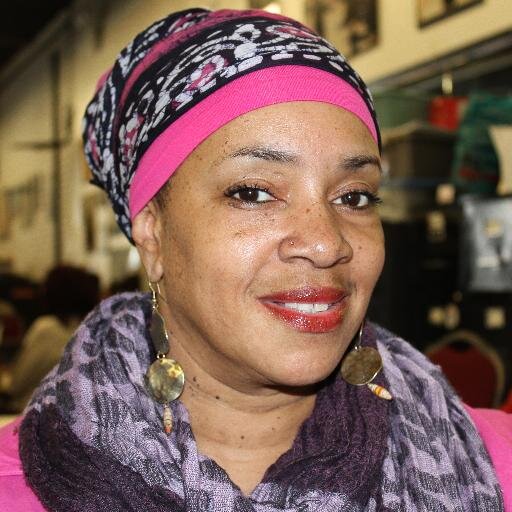 |
| From L to R Kathy Horan, Oresa Williams, Iesha Sekou, Andre T. Williams, and Marlon Peterson |
This panel was an event specifically designed to discuss youth violence in the ghetto, disseminate information on organizations that are trying to combat it, and to brainstorm on what steps can be taken to stem the tide. The most recent senseless death weighed heavily on everyone's perspective, the unconscionable murder of NY Deputy General Counsel Carey Gabay -- a Harvard grad and fellow Jamerican, illustrating why organizations like these are needed. The featured speakers were people who'd been deeply impacted by the violence they'd experienced in their own lives but chose to actively do something about it instead of simply accepting it or letting it break their spirits.
| Desean Hill (1995-2003) |
Marlon Peterson, founder of the Precedential Group, spent a decade in prison for an armed robbery that resulted in death of his friend. He shared a personal story about how circumstances and bad choices can scar you for life and despite everything that he's done positively since his release, there are still people who will never see him as anything more than a criminal, specifically the loved ones of the person that died as a result of his actions. He has worked tirelessly with his group to arrest the cycle of violence where they can through his writing, which has appeared in many major publications and websites, and speaking engagements like this.
 |
| Iesha Sekou, CEO of Street Corner Resources |
Iesha Sekou, founder and CEO of Street Corner Resources, is one of those people who is more of a force of nature than a personality. She, more than anyone one the panel, made me smile with her unapologetic style and straightforward approach. I always love those women that not only stand in their purpose but wield it like an Zulu spear, effecting positive change without compromising her values. Iesha, like most of the panelists shared a personal story of how violence shaped her worldview and how it compelled her to be the voice to the voiceless through her radio show and irrepressible activism. She's a member of more committees, councils, and organizations than I, ashamedly, can remember but she was by far my favorite panelist.
The story of final panelist, Oresa Napper Williams, founder of the grief support organization Not Another Child, hit closest to home and was absolutely heartbreaking. Her son was taken from her when he was 13, murdered by a 15 year old following the orders of a 32 year old thug. Her story was how her organization helped her become functional again by helping others who were suffering like she was. She even found a way to forgive the boy who killed her son. The main reason she was able to do so was because the boy was grieving for her son as much as she was. He didn't want to do it but the 32 year old threatened him. To make it worse, it was a case of mistaken identity that the 32 year old tried to justify at his sentencing hearing by dragging Oresa's son's reputation through the mud. Saying he shouldn't have been where he was or standing or with the people he was standing with as if caused his own death by being at the wrong place at the wrong time. That kind of scapegoating is all too familiar. There was one aspect of her story that I found surprising, though. After her son's death, some of her family chose to "move on" by not speaking his name. She didn't need to say it but the look on her face was one I recognized as she spoke. It was like they were killing him all over again. He existed. He lived, loved, laughed, cried, and meant something to the people who loved him. I can't imagine how pretending he was never here, like he never mattered, could be construed as "healing."
The young man's name, by the way, is Andrell Napper.
 |
| Petra Lewis w/ Kathy Horan |
It's tough to relate to the horrific scenarios described if you've never lived them but we can all relate to the grief of losing someone you love. We live, we love, we bleed, we cry, and we hurt just like everyone else and that truth of our humanity should strike a chord with everyone, regardless of background. Solving violence among our children is important work but also dependent on factors that are way beyond the control of the community itself. Some of them are familiar like, lack of government funding for education, high unemployment, and poorly maintained infrastructure. Others are more insidious like media and entertainment re-inforced negative stereotypes and historical precedent of discrimination. In short, there is a lot of work to do and we'll need all the help we can get.
Here are a list of links of the attendees with info on how you can get involved.
Man Up! Inc., Founder A. T. Mitchell http://www.manupinc.org/
Contact: atmitchell@manupinc.org
Not Another Child, Founder Oresa Napper Williams http://notanotherchild.org/
Contact: oresa@notanotherchild.org
Street Corner Resources, Founder Iesha Sekou http://scrnyc.org/
Contact: ieshasekou57@gmail.com
The Precedential Group, Founder Marlon Peterson http://www.precedentialgroup.com/
Contact: precedential@gmail.com
Petra Lewis http://www.hamnovels.com
Contact: Petra@Petralewis.com
No comments:
Post a Comment